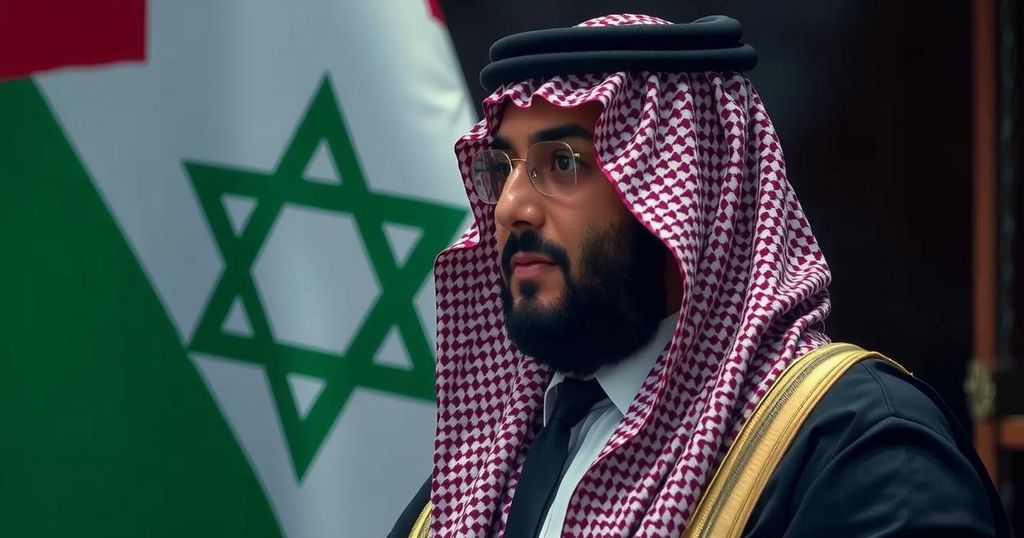Global news
ASIA, CONFLICT, DONALD TRUMP, FAI, FAISAL BIN FARHAN AL - SAUD, GAZA STRIP, GAZA WAR, HAMAS, HUMAN RIGHTS OFFICE, HUMANITARIAN CRISIS, IRAN, ISRAEL, ISRAELI-PALESTINIAN CONFLICT, JOE BIDEN, KNESSET, MIDDLE EAST, MILITARY OPERATIONS, MOHAMMED BIN SALMAN, NORTH AMERICA, TRUMP, UN, UNITED STATES, WEST BANK, WHITE HOUSE
Leila Ramsay
0 Comments
Saudi Crown Prince Condemns Israeli Actions in Gaza as Genocide
Saudi Crown Prince Mohammed bin Salman has publicly condemned Israel’s military actions in Gaza as “genocide,” criticizing the international community’s inaction. His remarks come amidst escalating violence and humanitarian crises in the region, following Hamas’s attack on Israel and subsequent Israeli military responses. The summit highlighted calls for Israel to withdraw from the West Bank and Gaza, with increasing concerns over the treatment of UN personnel in the conflict.
Saudi Crown Prince Mohammed bin Salman has labeled Israel’s actions in Gaza as “genocide,” marking one of the most severe public criticisms of Israel from a Saudi official since the onset of the ongoing conflict. During a recent summit attended by Muslim and Arab leaders, he also condemned Israel’s military actions in Lebanon and its threats against Iran, emphasizing the need for a complete withdrawal of Israeli forces from the West Bank and Gaza. Additionally, Saudi Arabia’s Foreign Minister, Prince Faisal Bin Farhan Al-Saud, criticized the international community for its inaction concerning the Gaza war, asserting that the ongoing violence has led to dire humanitarian consequences, including starvation in the region. This conflict escalated on October 7, 2023, when Hamas launched a large-scale attack, resulting in significant casualties and hostages in Israel. In retaliation, Israel initiated a military operation aimed at dismantling Hamas, which has reportedly led to the deaths of over 43,400 individuals in Gaza, primarily civilians, as reported by the Hamas-run health ministry. The United Nations Human Rights Office has indicated that the majority of verified victims during a recent six-month period were women and children. The leaders at the summit voiced their discontent with what they described as Israel’s persistent assaults on United Nations personnel and facilities in Gaza. Furthermore, the Israeli Knesset has enacted legislation prohibiting the UN Relief and Works Agency (UNRWA) from operating within Israel, citing alleged collaboration with Hamas, a move that has garnered concern from several nations, including the United States and the United Kingdom, regarding the humanitarian impact. In the context of this summit, the potential return of Donald Trump to the White House looms large, as Gulf leaders recognize his close ties with Israel, while also valuing his relationship with their nations. Despite mixed sentiments regarding Trump’s record in the Middle East, he remains a favored figure in Saudi Arabia compared to President Joe Biden. Observers note that Trump’s previous actions, which included recognizing Jerusalem as Israel’s capital and facilitating the Abraham Accords, may influence future regional dynamics. An editorial in a key Saudi publication recently highlighted his potential to usher in stability, suggesting, “A new era of hope. Trump’s return and the promise of stability.”
The ongoing crisis in Gaza has drawn international attention and condemnation, particularly following an escalation of hostilities that began with a significant attack by Hamas on Israel. This triggered a severe military response from Israel, resulting in grave humanitarian consequences within Gaza. The conflict has reignited longstanding tensions between Israel and surrounding Arab nations, especially regarding human rights issues and the political ramifications of military actions. The Saudi Crown Prince’s comments reflect a growing discontent and a call for accountability on the global stage, amidst changing geopolitical alliances and the potential return of influential figures like Donald Trump. The situation is further complicated by Israel’s recent legislative acts concerning the UNRWA, which plays a crucial role in providing assistance to Palestinian refugees. The summoning of Arab and Muslim leaders to discuss these pressing issues reflects a collective concern for regional stability and humanitarian relief, showcasing a shift in diplomatic dialogue that could have long-term implications for Middle Eastern relationships and policy.
In summary, Saudi Crown Prince Mohammed bin Salman’s condemnation of Israel’s actions in Gaza as “genocide” signifies a pivotal moment in Arab-Israeli relations, highlighting the dire humanitarian impact of the conflict. The collective call from Arab leaders for an end to Israeli aggression and a complete withdrawal from occupied territories emphasizes the urgency of addressing the humanitarian crisis. Additionally, the potential influence of Donald Trump’s leadership in the region may prompt further developments in diplomatic relations, underscoring the complex interplay of politics, humanitarian needs, and international pressure.
Original Source: www.bbc.co.uk




Post Comment